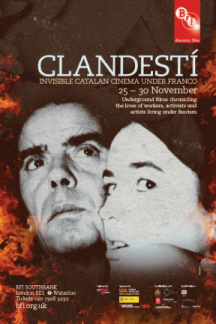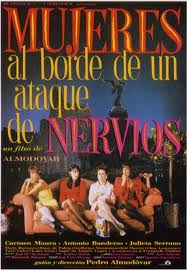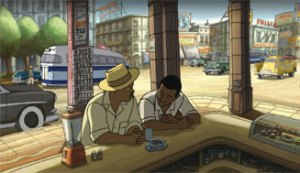The death of Spain’s fascist dictator Francisco Franco in 1975 gave rise to an alternative, adventurous and eclectic movement within Spanish culture, the movida. Next month BFI Southbank will host a season celebrating this brand of cinema with showings of Cria Cuervos (Raise Ravens, 1975) as well as Pedro Almodóvar’s Women on the Verge of a Nervous Breakdown (Mujeres al borde de un ataque de nervios, 1998),and the lesser known titles The Anchorite (El anacoreta, 1977) and Opera Prima (1980).
Good Morning Freedom! Spanish cinema after Franco at BFI Southbank
28 MayOpposition through film in Clandestí: Invisible Catalan Cinema under Franco
25 NovLittle is known of the hardship the Spanish people experienced under Franco’s dictatorship from 1939 to 1975 due to press censorship and isolationism. However, a new series of films created in secrecy during his regime are set to reveal this suffering first hand, some for the first time.
 Clandestí: Invisible Catalan Cinema under Franco, which takes place tomorrow until 30th November at BFI Southbank, features works produced by a group of Catalan filmmakers who chronicled the lives of workers, activists and artists living in one of the most fierce centres of opposition to the fascist regime.
Clandestí: Invisible Catalan Cinema under Franco, which takes place tomorrow until 30th November at BFI Southbank, features works produced by a group of Catalan filmmakers who chronicled the lives of workers, activists and artists living in one of the most fierce centres of opposition to the fascist regime.
These brave artists were connected with workers’ movements and outlawed opposition parties, such as Santiago Carrillo’s Communists, and managed to distribute their film through recreation centres, private homes, cinema clubs, universities and schools. Many of the films have no credits in order to protect the identities of their participants. Continue reading
The best of Latin American film comes to London
15 NovAre you a fan of Alejandro González Iñárritu or Alfonso Cuarón? Do Gabriel García Bernal and Diego Luna make you go a bit weak at the knees? Do you relish the gritty realism of Rosario Tijeras or Amores Perros? Or perhaps you’re new to Latin American cinema, in which case a real treat awaits you. This month the London Latin American Film Festival (LLAFF) celebrates its 20th anniversary with more films on offer and more venues than ever before.
From 19th to 28th November LLAFF will showcase 40 of the latest offerings in Latin American cinema in seven venues across the capital. The festival is bigger than ever this year as its anniversary coincides with the bicentenary of Latin American Independence. Eva Tarr-Kirkhope, the director and founder of LLAFF, said: “I wanted to make this year really, really, really big and I’m so pleased we have had so many films submitted. I’m still receiving submissions now when the closing date was in July. We could potentially have an audience of up to 20,000 people in total. It is very exciting for me.”
Through documentaries, shorts and feature films the festival aims to tackle the most relevant and poignant themes to the Latin American people. The centrality of the family in Latin American culture is obvious across the different genres. Films such as Chico y Rita, The Crab, the Crocodile and Love in Cuba and Revolution present nostalgia for the 1960s and 1970s, partly through a love of music. The documentary Rio Breaks, presents the poverty of Rio’s favelas with a twist as two young boys enter the surfer community of Arpoador Beach in search of making the big time. Continue reading


